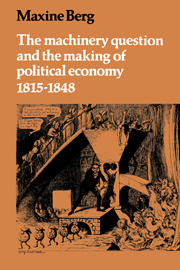Book contents
- Frontmatter
- Contents
- List of Illustrations
- Preface
- Introduction
- PART ONE THE MACHINERY QUESTION
- PART TWO THE POLITICAL ECONOMY OF MACHINERY
- PART THREE A SCIENCE OF MACHINERY
- PART FOUR THE POLITICS OF MACHINERY
- 9 The export of machinery
- 10 The handloom weavers
- PART FIVE THE SOCIAL CRITICS OF MACHINERY
- EPILOGUE: BEYOND MACHINERY
- Bibliography
- Index
10 - The handloom weavers
Published online by Cambridge University Press: 29 January 2010
- Frontmatter
- Contents
- List of Illustrations
- Preface
- Introduction
- PART ONE THE MACHINERY QUESTION
- PART TWO THE POLITICAL ECONOMY OF MACHINERY
- PART THREE A SCIENCE OF MACHINERY
- PART FOUR THE POLITICS OF MACHINERY
- 9 The export of machinery
- 10 The handloom weavers
- PART FIVE THE SOCIAL CRITICS OF MACHINERY
- EPILOGUE: BEYOND MACHINERY
- Bibliography
- Index
Summary
The debate on the export of machinery revealed the fear among industrialists that Britain would lose the machine to other nations. Another parliamentary debate, the controversy over the handloom weavers, demonstrated that not only was the machine being taken by foreign rivals but it was being repulsed at home. The export-of-machinery debate reminded political economists and industrialists that, though the machine and its makers had given Britain her lead, these could also go to other countries. New industrial nations would soon come to challenge Britain's old superiority. With foreign economic advance presenting such a threat, the idea that the progress of the machine was being resisted and undermined even on the inside gave the Machinery Question a pressing urgency. The debate on the handloom weavers was a stark testimony to the fear of and antipathy towards the machine in many parts of British society. The distress and dissension in the working class seemed directly associated with the spread of machinery. It contributed to a wider discord over the extent to which the machine disrupted old ways of life, created unemployment, and disfigured the landscape. Within the very framework of economic and scientific advance, the weavers cast a permanent and painful shadow. If the first Industrial Revolution was an experience of excitement and prospects for many living through the rapid transformation, never far from this was the consciousness of a massive and lingering case of technological unemployment.
- Type
- Chapter
- Information
- Publisher: Cambridge University PressPrint publication year: 1980

